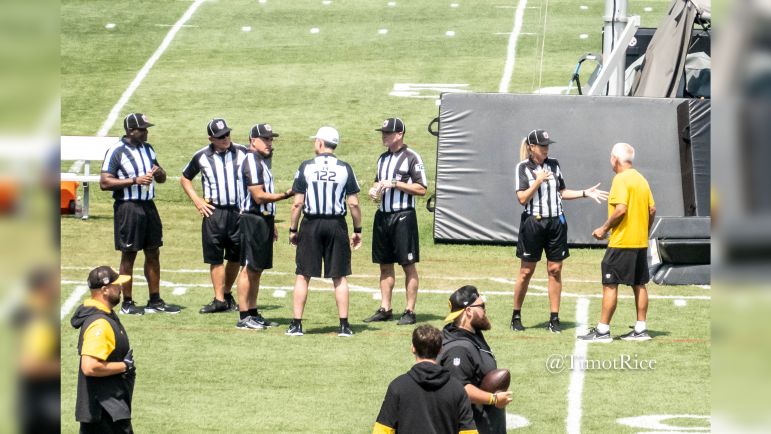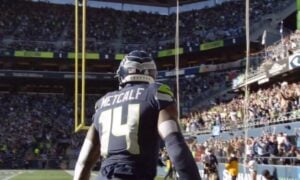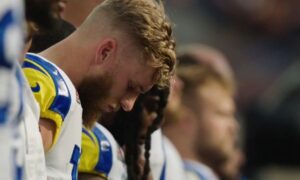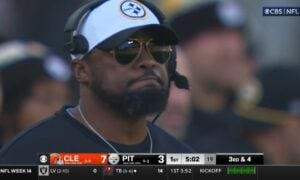We are one week into the season, and fans are already questioning some of the referee’s calls. In the Steelers game, it was a mix of missed calls (Najee’s helmet ripped off his head or a Chiefs coach calling an unauthorized timeout), phantom calls (T.J. Watt not offsides on his first strip sack and no defender touched George Pickens to make him down by contact), frustrating calls (Broderick Jones penalized for defending a teammate who was punched causing an offsetting penalty instead of a first and goal), and new rules (7 of 9 kickoffs in the Pittsburgh-Atlanta game were touchbacks instead of being returned)
Here is my perspective as an average Steelers fan on a few:
New Kickoff
This year, the NFL adopted new kickoff rules to encourage more returns while maintaining player safety. The Football database shows teams returning 57 kickoffs for 1,548 yards after Week 1. That’s about 27.2 yards per return. In week 1, only one kickoff returned for a touchdown. The Cardinals’ DeeJay Dallas returned a kick 96 yards to pay dirt against the Bills. Still, nearly two-thirds of kicks are touchbacks in the end zone.
On the Pat McAfee Show, Bill Belichick said he’d rather take a touchback at the 30-yard line than give a good returner a chance to score. He anticipated a lot more touchbacks in the regular season.
Belichick suggested moving the kicker back further to make touchbacks more difficult. Another possibility is placing the ball at the 35-yard line following a touchback in the end zone.
My perspective is that the more kickoffs, the better. At least the players on the field determine where the initial line of scrimmage is rather than by rule. That’s more fun. After this season, if kickoffs are not returned closer to 50 percent of the time, I would change the touchback placement from the 30 to the 35-yard line.
Calling Timeout
During the NFL season opener, Chiefs defensive coordinator Steve Spagnuolo called for a timeout. The officials awarded the timeout. The only problem is that the head coach is the only person on the sideline permitted to call a timeout. The Chiefs were not penalized, and the game continued with an eventual 27-20 Chiefs win over the Baltimore Ravens.
As a long-time rugby player, I prefer that game’s player-centric approach. Only the team captains can talk to the referee to clarify calls. I’d rather have designated players on the field of play be the only people to call a time-out. On offense, it is the quarterback or other team captain. On defense, whoever has the green dot and that unit’s team captain. It’s the same on special teams. The coaches could still challenge plays. But communication should be more focused between the officials and the players.
Offsetting Penalties
I don’t like offsetting penalties. They erase plays as if they never occurred unless both penalties occur after the whistle. That happened in the Steelers game when the Falcons’ G. Jarrett hit a Steelers player and mauled him after the whistle. Broderick Jones came over to pull Jarrett away, and both were assessed with unsportsmanlike penalties. But Najee Harris’ six-yard run stood. First, I don’t think that Broderick Jones should have been flagged at all. But even if he was, his actions were not so egregious as Jarrett’s, who initiated the fracas. It should have been first and goal instead of third and two at the 7.
According to the NFL rulebook, if there is more than one foul (penalty) on a play, only one penalty can be assessed. If the same team commits fouls, then the other team can choose which to accept. But if there are fouls by both teams, then the fouls offset, and “the down is replayed, and the number of the down remains the same.”
There are a couple of exceptions, such as a foul against an official or a personal foul that is also defensive pass interference. In those cases, both may be enforced. There are also rules for special situations, such as a “double foul with a change of possession.” Way too much detail to get into here.
However, my main point is that the NFL should do a better job of prioritizing penalties. So, a relatively minor penalty that may not impact play does not offset a more egregious penalty by the other team.
Conclusion
The NFL revises several rules every year. These are three areas in which I’d like to see some changes. Overall, I prefer to let the players determine the outcome of games. As Bert Bell once said as the NFL Commissioner in 1946: “The league … realizes that if a fan attends a game and goes away without remembering the referee, umpire, field judge or linesman, that a game must have been expertly officiated.”
Your Song Selection
I always like to include a bit of music. It would be so easy if the teams just stopped breaking the rules. But there are so many, and some are enforced while others are let go. How can there ever be consistency? Here is Don’t Break the Rules from Catch Me if You Can, performed at the 2011 Tony Awards.








